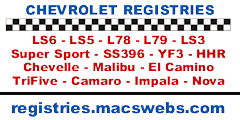Tracing Ownership of my Chevelle
|
ChevyWorld.net
|
|
Due to privacy laws in many states, their DMV or
Highway Patrol will not run a car's VIN to find a
current or previous owner at one's request. Imagine you
have your Chevelle at a local car show or even a
shopping mall parking lot and someone takes a shine to
it. They get the state to search who owns the car, they
find you and your car and, well, steal it. Not a
comforting thought. In 1994 the Driver Privacy
Protection Act, , Public Law No. 103-322 codified as
amended by Public Law 106-69, was originally enacted in
1994 to protect the privacy of personal information
assembled by State Department of Motor Vehicles (DMVs).
Some states will 'run a VIN' for a fee. The problem here is states typically only keep records of registration while the car is in the state and registered there. Once the vehicle is no longer registered in the state, that state has no interest in it and is dropped from their database of information after a few years.
When/if (heaven forbid) you are stopped by law enforcement for a moving violation or, worse yet, a vehicle accident, local law informant can 'run' the vehicle's VIN and license number to determine who is the current registrant of the car and what car the license plate belongs to. Law enforcement can only legally do this for official business. They cannot (legally) do this as a 'favor' for a stranger or even a friend.
Ownership of a vehicle averages about 8 years. as people move on to newer cars, are forced to trade/sell for family reasons, or just want a new car every couple of years. In the past 20 or 30 years some of us tend to keep a car ('classic' or not) for a longer period or hand a car down to relatives and the car never leaves a state. Others, like those with a good market value, may get bought/sold/flipped much more often. When a vehicle changes hands by a dealer the state may check the VIN against a national database to see if it's a valid VIN and not reported stolen or salvaged. When a vehicle changes hands through private sales, the buyer doesn't have the luxury of knowing beforehand if the car is stolen or reported salvaged until they attempt to register the car.
If it's a 'classic' car, regardless of manufacturer, social media and forums are a place one can start. Postings on social media are generally only visible for a few days so chances are pretty slim of getting any information of value. Forum questions tend to last longer but unless some is a forum regular, y09u may get a few suggestions for a short period of time before interest in the thread wanes.
A truly classic, high-end, rare valuable car is often much easier to trace its linage due to their nature and national registries such as the DuPont Registry. numerous Corvette registries, MoPar and Must and registries but like my 25 various Chevrolet Registries from 1955 through 2011 depending on the particular Chevrolet vehicle. These various registries I own are relatively new, 15 years for some as of this writing, and typically contain registered owners at the time. When a car is one of my registries is sold, it's often not reregistered by the new owner so its history gets lost.
|
CDs/Coins/Gifts/Stickers
See more ChevelleCD Chevy-related products here ↓
Mac's Registries
See more about Chevrolet/Camaro/Monte Carlo/Nova/HHR/SSR/Acadian/Beaumont registries here ↓
Chevrolet Clubs |
|
|
|





